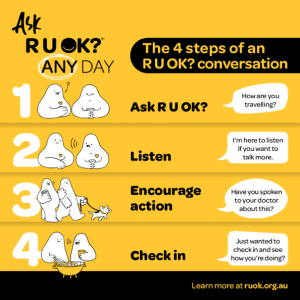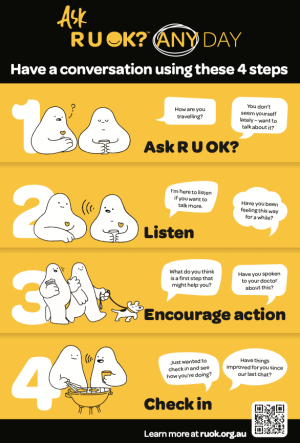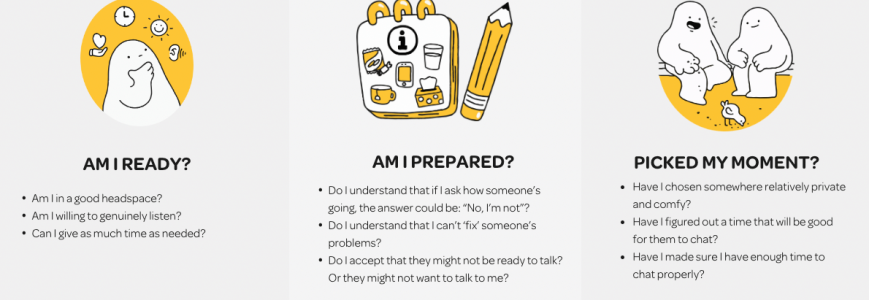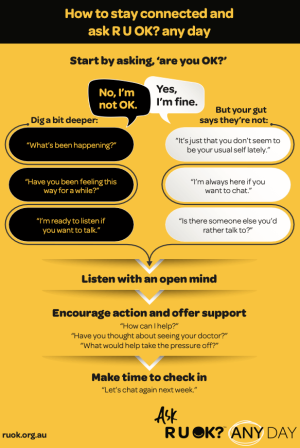Ask Joy: R U OK?
- Replies 51
Note from the Editor:
This article was kindly written for the SDC by retired psychologist/ member @Joy Straw.
The annual campaign is a month of action highlighting the importance of meaningful conversations. In 2024, R U OK? is calling on everyone to ask, ‘R U OK?’ any day because life happens every day.
The reminder to ask ‘R U OK?’ comes as the Suicide Prevention Australia Community Tracker shows that 72% of Australians reported experiencing elevated levels of distress in the latest June data.
R U OK? Day encourages Australians to check in with others all year round. Recent research commissioned by R U OK? found that people who are regularly asked if they are okay feel more supported, connected and cared about.
Do you have a feeling that someone you know or care about isn't behaving as they normally would? Perhaps they seem out of sorts? More agitated or withdrawn? Or they're just not themselves. Trust that gut instinct and act on it. Learn more about the signs and when it's time to ask, ‘R U OK?’
By starting a conversation and commenting on the changes you've noticed, you could help that family member, friend or workmate open up. If they say they are not OK, you can use the following conversation steps to show them they're supported and help them find strategies to better manage the load. If they are OK, that person knows you care enough to ask.
Don’t be afraid to follow up.
Being depressed or feeling like your problems are insurmountable can often be significantly reduced by sharing your concerns with another person. Sometimes, just reaching out may be enough to bring someone the comfort they require to move beyond their current problems.
Be prepared, and don’t think you’re going to trigger someone into a deeper depression or suicidal ideation. Just by reaching out, you may, in actual fact, bring them the help that they need. If at any time you feel the person is beyond your help, then seek professional help. See the end of this article. Offer to drive them to the GP. Or if it is urgent, take them to the local hospital.
In psychology, there are different forms of therapy. One of the well-known therapeutic styles is 'Talking Therapy', which is a professionally guided conversation with a therapist. You may be the introduction to 'talking therapy' and then professional counselling if the individual needs further help.
How can I help myself or someone suffering from depression?
First, do not tell yourself or them 'to get over it', 'it’s not that bad', or 'look on the bright side'. Believe me, if they could, they would. If you are suffering, don’t be afraid to reach out online or in person (see the end of the article for resources).
Connect with others
Physical, sensory activities
Get active. For example, walk, run, cycle, swim, surf, do yoga, Pilates, tai chi, or garden.
Change surroundings
Creative expression
Keep busy
R U OK?
I was working with a group of adults who had lost loved ones through death or divorce. At the end of the 10 week sessions, the group mainly women asked if anyone wanted to be part of a group hug. A quiet male voice, one of two men in the group, asked if he could join in. When everybody enthusiastically said’ yes’ he quietly stated it was the first time he had been touched in over 12 months.
Don’t be afraid to ask R U OK? Not everyone can ask for help, but everyone can listen.
The following are some of the best places to find resources or to seek help. Don’t be afraid to reach out.

Lifeline 13 11 14
Kids Helpline 1800 55 1800
Beyond Blue 1300 084 006
Suicide Call Back Service 1300 659 467
Headspace 1800 650 890
13YARN 13 92 76
Mindspot 1800 61 44 34
MoodGym
Black Dog (02) 9382 2991
Mensline 1300 78 99 78
About the author: My name is Joy Straw, and I’ve been a counsellor and (now retired) psychologist working with couples and individuals, as well as children in crisis, for over 30 years. I am a widow with two children and three grandchildren and have recently moved to a retirement village and am loving life again.
Interested in reading more from Joy? You can find all her articles here.
Looking for immediate support? Here is a list of free mental health helplines.
You can ask Joy a question here. If you’d rather stay anonymous, email your question to [email protected].
This article was kindly written for the SDC by retired psychologist/ member @Joy Straw.
The annual campaign is a month of action highlighting the importance of meaningful conversations. In 2024, R U OK? is calling on everyone to ask, ‘R U OK?’ any day because life happens every day.
The reminder to ask ‘R U OK?’ comes as the Suicide Prevention Australia Community Tracker shows that 72% of Australians reported experiencing elevated levels of distress in the latest June data.
R U OK? Day encourages Australians to check in with others all year round. Recent research commissioned by R U OK? found that people who are regularly asked if they are okay feel more supported, connected and cared about.
Do you have a feeling that someone you know or care about isn't behaving as they normally would? Perhaps they seem out of sorts? More agitated or withdrawn? Or they're just not themselves. Trust that gut instinct and act on it. Learn more about the signs and when it's time to ask, ‘R U OK?’
By starting a conversation and commenting on the changes you've noticed, you could help that family member, friend or workmate open up. If they say they are not OK, you can use the following conversation steps to show them they're supported and help them find strategies to better manage the load. If they are OK, that person knows you care enough to ask.
Don’t be afraid to follow up.
Being depressed or feeling like your problems are insurmountable can often be significantly reduced by sharing your concerns with another person. Sometimes, just reaching out may be enough to bring someone the comfort they require to move beyond their current problems.
Be prepared, and don’t think you’re going to trigger someone into a deeper depression or suicidal ideation. Just by reaching out, you may, in actual fact, bring them the help that they need. If at any time you feel the person is beyond your help, then seek professional help. See the end of this article. Offer to drive them to the GP. Or if it is urgent, take them to the local hospital.
In psychology, there are different forms of therapy. One of the well-known therapeutic styles is 'Talking Therapy', which is a professionally guided conversation with a therapist. You may be the introduction to 'talking therapy' and then professional counselling if the individual needs further help.
How can I help myself or someone suffering from depression?
First, do not tell yourself or them 'to get over it', 'it’s not that bad', or 'look on the bright side'. Believe me, if they could, they would. If you are suffering, don’t be afraid to reach out online or in person (see the end of the article for resources).
Connect with others
- Be around other people
- Text or call friends or family
- Connect to your culture
- Visit online peer support forums
- Call helplines (see end of article)
- Contact your GP
Physical, sensory activities
Get active. For example, walk, run, cycle, swim, surf, do yoga, Pilates, tai chi, or garden.
Change surroundings
- Go outside into nature – hike, walk, gardening
- Spend time in a quiet place – library, museum, church
- Visit somewhere you can be around people, e.g. a cafe, park, shopping centre
- Go to a different room in the house
- Don’t stay in bed or in your pyjamas unless physically ill.
Creative expression
- Write - journal, make plans for a holiday, write a letter
- Paint or draw
- Embroider or learn to knit/crochet
- Dance or make music
- Design or make fashion
- Be constructive – woodwork or model-making
Keep busy
- Do cleaning or laundry
- Grocery shopping
- Tackle something on your to-do list
R U OK?
I was working with a group of adults who had lost loved ones through death or divorce. At the end of the 10 week sessions, the group mainly women asked if anyone wanted to be part of a group hug. A quiet male voice, one of two men in the group, asked if he could join in. When everybody enthusiastically said’ yes’ he quietly stated it was the first time he had been touched in over 12 months.
Don’t be afraid to ask R U OK? Not everyone can ask for help, but everyone can listen.
The following are some of the best places to find resources or to seek help. Don’t be afraid to reach out.
Lifeline 13 11 14
Kids Helpline 1800 55 1800
Beyond Blue 1300 084 006
Suicide Call Back Service 1300 659 467
Headspace 1800 650 890
13YARN 13 92 76
Mindspot 1800 61 44 34
MoodGym
Black Dog (02) 9382 2991
Mensline 1300 78 99 78
About the author: My name is Joy Straw, and I’ve been a counsellor and (now retired) psychologist working with couples and individuals, as well as children in crisis, for over 30 years. I am a widow with two children and three grandchildren and have recently moved to a retirement village and am loving life again.
Interested in reading more from Joy? You can find all her articles here.
Looking for immediate support? Here is a list of free mental health helplines.
You can ask Joy a question here. If you’d rather stay anonymous, email your question to [email protected].
Want more articles like this? Becoming an SDC Rewards Member is the best way to show your support—from $5.99 per month.











